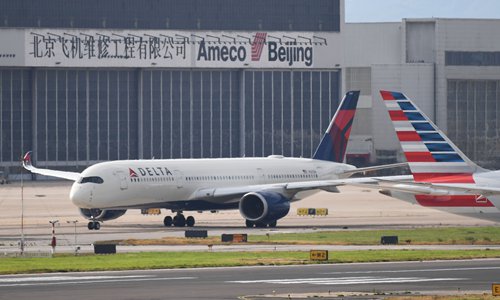SOURCE / AVIATION
Delta Air Lines displaying confidence in China market amid pullbacks by other carriers
Thinking differently

A Delta Airlines Airbus A350 aircraft waits to take off at Beijing Capital International Airport on July 25, 2018. Photos: VCG
Delta Air Lines, an Atlanta-based US carrier still shows their confidence in the Chinese market and wants to increase the routes into China amid the background of several carriers suspending their flights between China and the US in recent months.
Delta Air Lines plans to open a new Shanghai-Minneapolis route in 2020 to further expand the Sino-US market, the company said at a news conference on Monday. The company said it plans to operate the flights with Airbus A350, and it will be the first airline to fly the aircraft for Sino-US flights.
It will be the first-ever nonstop flight between Minneapolis and Shanghai, and it will offer travelers access to more than 70 destinations in China beyond Shanghai, in cooperation with partners China Eastern and Shanghai Airlines.
The carrier is the second-largest carrier on the China-US routes and currently operates six Sino-US routes, including Beijing to Seattle and Detroit, Shanghai to Seattle, Los Angeles and Atlanta. In July last year, Delta reopened the Shanghai-Atlanta route, providing the only flight between the Chinese mainland and the Southeastern part of the US.
"We have a long-term strategy for the Sino-US aviation market and we remain optimistic for the long-term growth potential in the market," said Wong Hong, president of Delta Air Lines for the China and Singapore region.
He said making the decision to open a long-haul flight is not easy, as the cost is very high, but the move shows the carrier has confidence in the Sino-US aviation market.
The US destinations on Delta's China-US routes are mostly located on the east and west coasts, while the Minneapolis is located in north-central Minnesota, which will help Delta build an aviation network that covers the entire US.
The carriers in the two countries have stopped six direct flights in the recent two years due to poor performance.
Last year, American Airlines stopped the routes from Shanghai/Beijing to Chicago, Hawaiian Airlines stops flights from Beijing to Honolulu, and United Airlines, the biggest carrier in the Sino-US aviation market stopped flying Hangzhou/Xi'an to San Francisco. In total, there were six carriers that stopped their flights in the market.
Those stopped flights have triggered much discussion, and it is widely agreed that the market has overcapacity, and the competition is very fierce.
Looking back, the carriers from the two countries were busy opening intercontinental routes between 2014 and 2017, and even China's second-tier cities flocked to open long-haul routes as well.
In 2013, the number of passengers transported in the China-US aviation market exceeded 440,000, with a growth rate of 15.47 percent, and it has maintained a strong growth rate of more than 15 percent for the following three years. In 2016, it even reached 25.57 percent. However, the market experienced a turning point in 2017, as the growth rate plummeted to 5 percent, data from CADAS, a research institution operated by aviation news portal carnoc.com showed.
However, Delta is thinking differently.
Wong said the Sino-US aviation market has seen fast expansion, and the trend will continue, especially supported by the rising demand, and the sales for most of its Sino-US flights have remained stable during the on-going Sino-US trade dispute.
"We have noticed some trade disputes, but our passenger flow is still stable without significant fluctuation. We will keep a close watch on the relationship between the two countries," he said.
The sales income per seat in the third quarter last year in the Asia Pacific region increased 4.8 percent over the same period last year, according to 21st Century Business Herald in November last year.
In 2015, Delta invested $450 million to acquire a 3.55 percent stake in China Eastern Airlines and became the largest overseas shareholder of China Eastern, hoping to transform the business in the trans-Pacific region.
When asked the question if the company will also move to the Beijing Daxing International Airport upon completed, Wong said China Eastern will move to the new airport but "we are still doing our research and have not decided yet."

